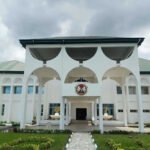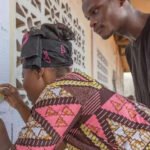Civil society organisation, Human Rights Writers Association of Nigeria (HURIWA) has called on the Independent National Electoral Commission (INEC) to make public, the details of politicians buying and storing up Permanent Voter Cards (PVCs) to rig the 2023 general elections.
HURIWA’s National Coordinator, Emmanuel Onwubiko, made this call on Thursday in Abuja.
Onwubiko noted that if INEC is serious about conducting credible elections in 2023, then politicians involved in such act must be named, shamed and prosecuted immediately, and there must be no coverup.
The electoral commission had on Monday raised the alarm that some politicians have been buying up PVCs and financially inducing unsuspecting voters to harvest their voter identification numbers ahead of the 2023 elections.
The assertion was made by the National Commissioner overseeing the FCT, Nasarawa, Kaduna and Plateau states, Mohammed Haruna.
He also disclosed that two people were recently convicted for illegal possession of PVCs in Sokoto and Kano states.
‘We are aware some politicians are more or less buying the PVCs. If you collect the PVC and then you sell it out or allow someone else to have it, you are aiding illegal possession of the PVC which is an offence in our Electoral Act’, Haruna said.
HURIWA has also called for the speedy passage of the bill for a law to establish the National Electoral Offences Commission and Related Matters 2022, which is before the House of Representatives.
It said the existence of such a commission would deal with electoral offenders, including PVC buyers.
‘We condemn the actions of desperate politicians buying and storing up PVCs for electoral malpractices’, the CSO said.
‘It is important that this method of vote-buying be punished and INEC should disqualify all those buying PVCs, arrest them and prosecute them in the courts’.
Research done by Statista showed that in Nigeria, people living in rural areas are more likely to experience vote-buying in organised elections.
It also shows that as of 2019, 24 percent of male and 19 percent of female respondents declared that they were offered money or non‐monetary favours in exchange for their vote in state and national elections.






